In this article...
- Why rabbits make great pets
- 1. Rabbits have amazing personalities
- 2. Rabbits can be good family pets
- 3. Rabbits are relatively quiet
- 4. rabbits are really smart
- 5. Rabbits don't need a yard
- 6. Rabbits can be litter trained
- Why rabbits may not be for you
- 1. Rabbits need of exercise and space
- 2. Rabbits need a lot of attention
- 3. Rabbits can be destructive
- 4. Rabbits are expensive
- 5. Rabbits can get sick or injured easily
- 6. Rabbits are not as cuddly as they seem
- Conclusion
From their super soft coat to their fluffy cotton tail, rabbits make adorable pets. Most people misjudge rabbits thinking that they are cuddly pets that are easy to care for. Although they can make great pets, they also require a lot of work and care.
In this article, not only will we discuss why rabbits make such great pets, but also why rabbits aren’t necessarily the best pets for everyone.
Why rabbits make such great pets
1. Rabbits have amazing personalities
Rabbits are very sweet little animals. A lot of people compare them to dogs because they are very loyal and can bond deeply to their owners. They enjoy being with their owner and will hop from room to room following you, if allowed to do so. They will even nudge you with their nose if they want some love.
Some rabbits enjoy jumping in their owner’s lap for some good bonding time, while others prefer to lay down next to you so you can pet them. Every rabbit is different, and if you take the time, you will get to know how your rabbit likes to show affection.

Alternately, they are similar to cats because oftentimes they will let you know when they do and do not want attention. Because they are prey animals, they are not fond of being picked up. It is more enjoyable for them if you come down to their level and sit with them on the floor.
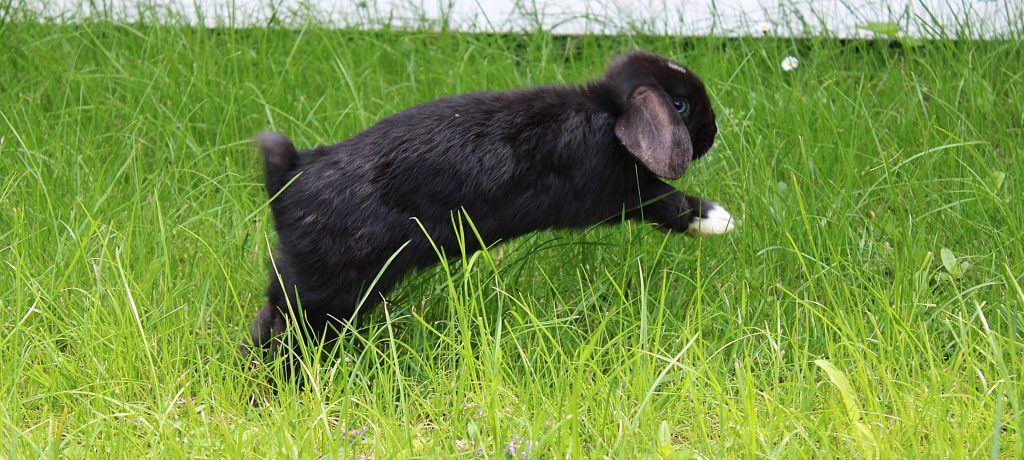
When they get really excited they will run around and do what is called a binky. A binky is when a rabbit jumps in the air and slightly twists their body, similar to a guinea pig’s popcorning move.
Rabbits don’t always bond to their humans immediately. It could take months, but if you put in the time and effort, it will be well worth it. As with all animals, each bunny has its own unique personality, and discovering their personality is half the fun!
2. rabbits can be good family pets
So with this statement I would like to be very very clear. Rabbits CAN be good family pets for SOME families.
Rabbits are delicate. They do not have flexible spines like cats, so if they are handled the wrong way or dropped on accident it could be fatal. Rabbits prefer to stay on the ground rather than being picked up so sitting on the floor and coming to their level is ideal. If you must pick up your rabbit, remember to use two hands and always support their back legs and bottom. If picked up the wrong way, it could cause them to kick and struggle, which could lead to them breaking their own backs.
Rabbits are prey animals, meaning their natural instinct when something is coming towards them is to run. Some small children may not understand this. They may chase the rabbit or lunge for them. Not only does this scare the rabbit, but if the rabbit gets too scared it can actually have a heart attack. Some stressed rabbits will bite or scratch which can frighten children.
If you are planning to get a pet rabbit for your child, you need to be realistic about the kind of responsibility that your child can handle. I personally think that if you, as the parent, are getting your child a pet, you need to be willing to step in and care for that pet 100% if your child loses interest or gets too busy.
That being said, you know your child. Some older children are perfectly capable of taking on the responsibility of a pet. Rabbits are very docile pets if they have a docile owner. Having a pet rabbit requires patience, calmness, and a lot of interaction. Rabbits are easily stressed and stress can lead to illness, so make sure you and your child discuss warning signs of illness and injury.
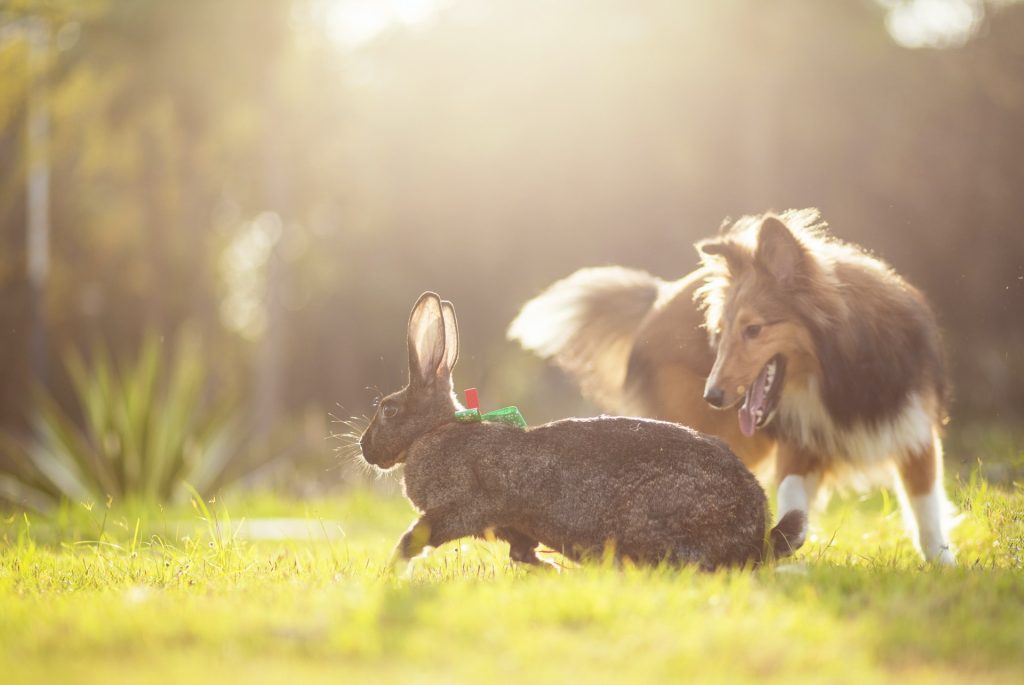
Rabbits value human interaction and NEED a lot of time to run around and get exercise. Three to four hours outside of the cage a day is the minimum.
Rabbits can even get along with other pets in the house if they are introduced in the right manner. This obviously depends on your dog or cat as well. If they are prey driven, it may not be wise to try and introduce them. But if you have an older dog or cat that is more on the mellow side, it may be possible for them to coexist and maybe even be friends.
3. rabbits are relatively quiet
If you aren’t a fan of barking dogs or howling cats, a pair of rabbits might be something to consider. Under normal circumstances they don’t make much noise at all, but if they are happy you might hear them chattering lightly. If they are in pain or extreme distress they can scream pretty loud but that is rare.
The only other noises that you could hear from them would be some thumping or running around the cage at night , but if you put your rabbit on a routine that involves enough exercise they will learn when it is time to settle down.
4. Rabbits are really smart
Did you know rabbits are actually very intelligent and can even be trained to perform tricks? Bunnies do especially well with clicker training. They are food motivated like dogs, so that makes training a little easier. Training also provides them with mental stimulation and can provide you and your bunny with a stronger bond.


5. rabbits don't need a yard
Rabbits don’t need a yard so they make good apartment pets. If the climate where you live isn’t too hot or too cold, rabbits can spend time outdoors, but ideally they should live indoors with you.
Firstly, they need companionship and attention so it is important that they are a part of the family. Second, it is much much safer to have your rabbit live indoors. There are several predators that are a threat to your rabbit outdoors.
6. rabbits can be litter trained
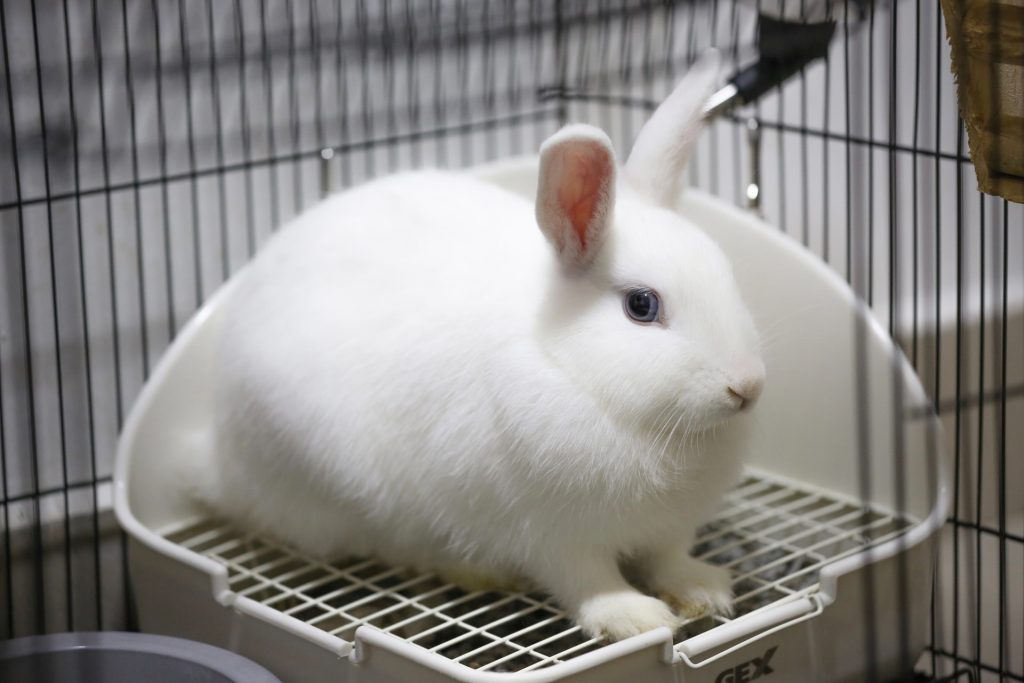
Rabbits are clean animals and prefer to go to the bathroom in one specific area in order to keep the rest of their “house” clean. This makes potty training not only possible, but for some rabbits it’s pretty natural.
Each rabbit is different. Where one rabbit may seem to grasp potty training immediately, another one may take a few months to learn. If you want a potty trained rabbit, you need to neuter him or her. Males will tend to mark all over your house if they are not neutered!
Why rabbits may not be for you
1. Rabbits need a lot of exercise and room to run around
Rabbits were literally born to run. In the wild, rabbits hop around looking for food. They play with fellow rabbits and run from predators.
It is very important to give your rabbit at least 3 -4 hours out of their cage for exercise if you want a happy and healthy rabbit. Three to four hours is the minimum amount of time to have your rabbit out, if you can do more it is always better.
Exercise is good for them, but if you bought a rabbit that was used to living in a small cage it might be depressed and/or not really used to having so much space to run around in. If you have a bunny that is a bit of a “couch potato,” then there are things you can do to encourage your rabbit to hop around and check out all their new space in order to get some exercise.
Most of the time, your rabbit should naturally love to hop and run all over the place, sometimes at top speeds! Rabbits are considered high-energy pets, so having an appropriately sized habitat is important. If your enclosure is too small, your rabbit may get depressed.
“A correctly sized enclosure will give your rabbit room for three to four hops along the length of their enclosure. The width should be at least one hop length, and the rabbit should be able to stand all the way up on their hind legs without bumping their head against the top.”
- Amy Pratt, The Bunny Lady,
https://bunnylady.com/best-rabbit-cage/
The Best Cage for House Rabbits (it’s not what you expect)
Surprisingly, if you have two rabbits, you do not need to have a significantly larger cage. However, if you have four rabbits, you should double the amount of space they have.
2. Rabbits need a lot of attention
Rabbits are very social animals. They want and need your attention.
Rabbits are not a good pet if you just want to have a pet in a cage that you need to feed. They need more than that.
They need interaction, mental stimulation, and exercise. If these things are not provided for them, they can act out. You may notice more destructive behaviors or you may see your rabbit becoming depressed.
For a happy rabbit, they should have a minimum of 4 hours out of their cage every day. If you have a playpen for them to exercise in, you should put it in the middle of the most active part of your house.
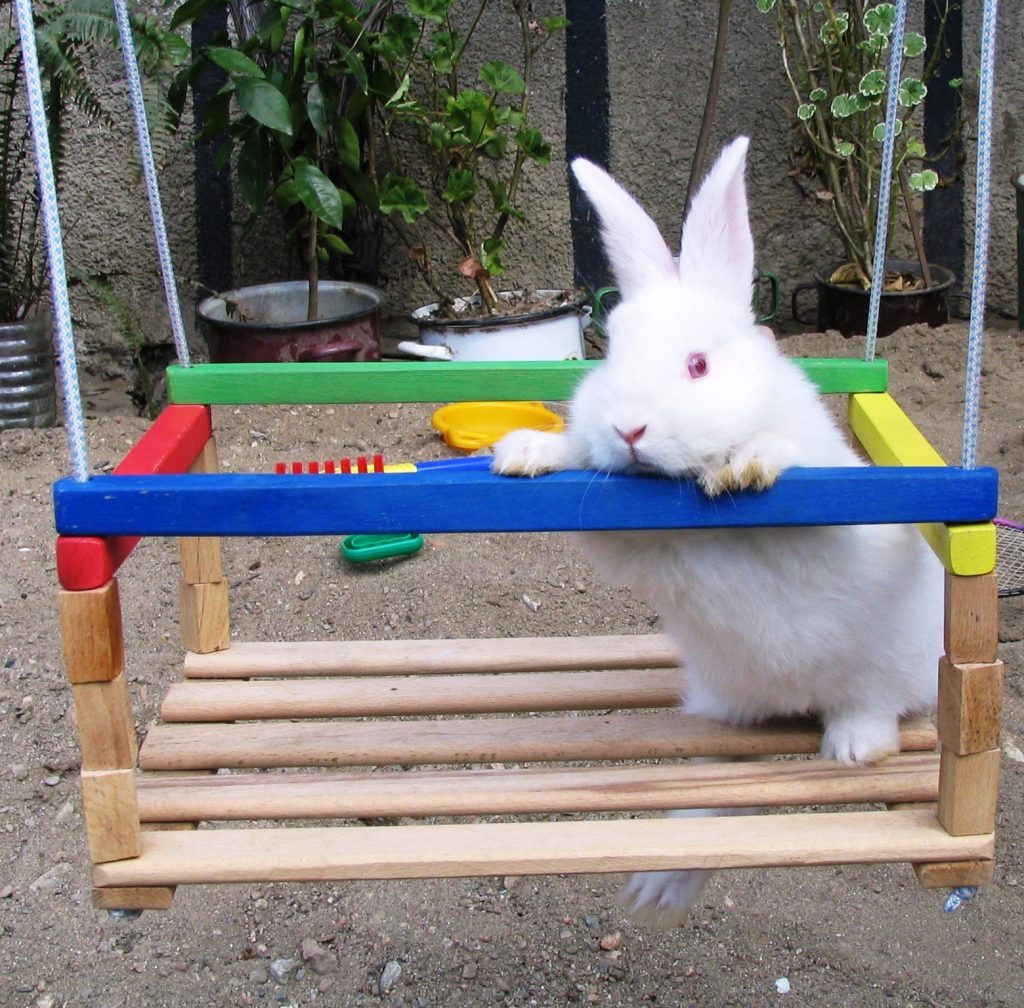
3. Rabbits Can Be Destructive
Rabbits love to chew and scratch and dig. These habits are just in their nature so this is not something you will be able to train out of them.
Rabbits’ teeth do not stop growing so they rely on chewing things in order to grind down their teeth so they don’t get too long. Providing your rabbit with plenty of hay and toys should help, but bunny proofing your house will always be necessary.
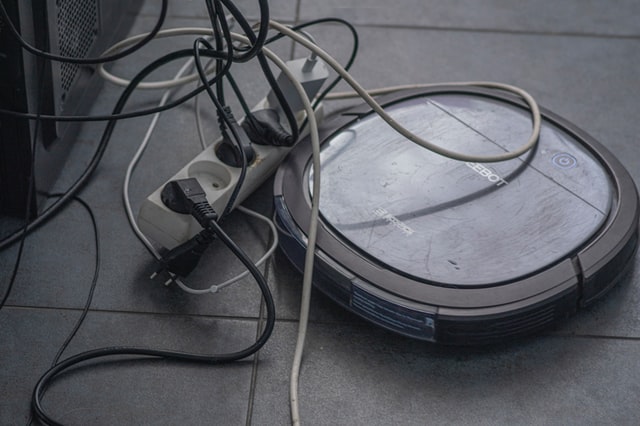
Bunny proofing your house should involve putting up any wires that your rabbit could possibly chew as well as anything on your rabbit’s level that they could potentially ruin. Other things that your rabbit could possibly damage includes furniture, such as table legs, chair legs, and couches to name a few, baseboards, door jams, and plants. Putting up baby gates or using a large play pen can be helpful if you aren’t able to completely bunny proof your house.
Rabbits also love to scratch and dig so offering them a place where it is ok for them to do both will be to your advantage. You can give your rabbit a box filled with shredded paper or hay to dig in so that they will dig in their box rather than digging up your carpet.
Not all rabbits are big diggers and these destructive behaviors also vary depending on age, sex, and if they are neutered or not.
4. Rabbits are expensive
The initial cost of getting any new pet is typically the most expensive because you have to pay for the full set-up: habitat, bedding, food, hay, water bottle, play pen, toys, litter pans, litter, cleaning supplies for cleaning habitat, brush, and nail clippers. Then, once the rabbit is old enough, getting them neutered or spayed is an added, but necessary, expense.
Rabbits are delicate and fragile animals that will need veterinarian care from time to time. Rabbits are considered an exotic pet, which means you have to take them to a vet that sees exotic pets, and it is even better if you can find a vet specializing in rabbits. Sometimes these vets are not easy to find, and since they can be in high demand, their prices may reflect that.
You will also have expenses for when you bunny proof your house. This could include plastic mats to prevent digging, wire covers to prevent chewing, as well as baby gates, or other means of keeping your rabbit away from certain areas.
Monthly costs primarily include hay, food, veggies, litter, toys, treats, and bedding. You can cut costs by making homemade toys or using fleece or bath mats instead of bedding.
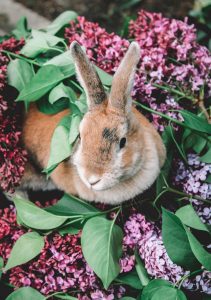
5. Rabbits can get sick or injured easily
This point can also tie into the one above describing rabbits possibly costing a lot of money.
Rabbits are rather fragile which means they can have various health problems. Some of these can be avoided if you are careful with your rabbit, handling them with care, and providing them with everything they need.
For instance, overgrown teeth can be avoided if you give your rabbit enough things to chew on. Hairballs are less likely to occur if you brush and groom your rabbit properly.
Other health concerns may be respiratory illness, ear mites, abscesses, gastrointestinal upset, and cancer. Rabbits also have delicate spines and skeletons so if they are not picked up and held carefully, they could get scared and struggle and wind up breaking a bone.

6. Rabbits are not as cuddly as they seem
It is a common misconception that rabbits are super cuddly and love to be held. Rabbits are prey animals so their first instinct is always to run. They do not like to be picked up because of this fact. They always feel the need to be able to run if need be, so being in your arms can make them feel trapped.
To have the best relationship you can have with your rabbit, you must first understand them.
Some rabbits can take a while to trust you, so having patience with them is very important.
If you give them the time that they need to build trust, you will learn a lot about your rabbit and what ways will work best in order to strengthen your bond.
conclusion
As with any animal, there are some pets that are better suited for certain people and families and others that are not. It is important to research what kind of pet an animal makes before deciding to buy or adopt.
Rabbits make really good pets, even if they aren’t necessarily the cuddly fur balls everyone thinks they are. Instead, they have more independent natures that take time and patience to explore and understand.
Whether a pet rabbit is for you or not, they are still amazing animals with big personalities that everyone should learn more about!
Do you have a pet rabbit? What is one thing you would want to convey to a new rabbit parent?
Sources
“Caring for Rabbits.” Peta. https://www.peta.org/living/animal-companions/caring-animal-companions/caring-rabbits/
Carter, Lou. “What are the Pros and Cons of Indoor Rabbits as Pets?” Rabbit Care Tips, July 13, 2021, https://www.rabbitcaretips.com/pros-and-cons-of-rabbits-as-pets/#Rabbits_Need_Company
Pratt, Amy. “The Pros and Cons of Having Rabbits as House Pets.” The Bunny Lady. https://bunnylady.com/rabbits-as-house-pets/

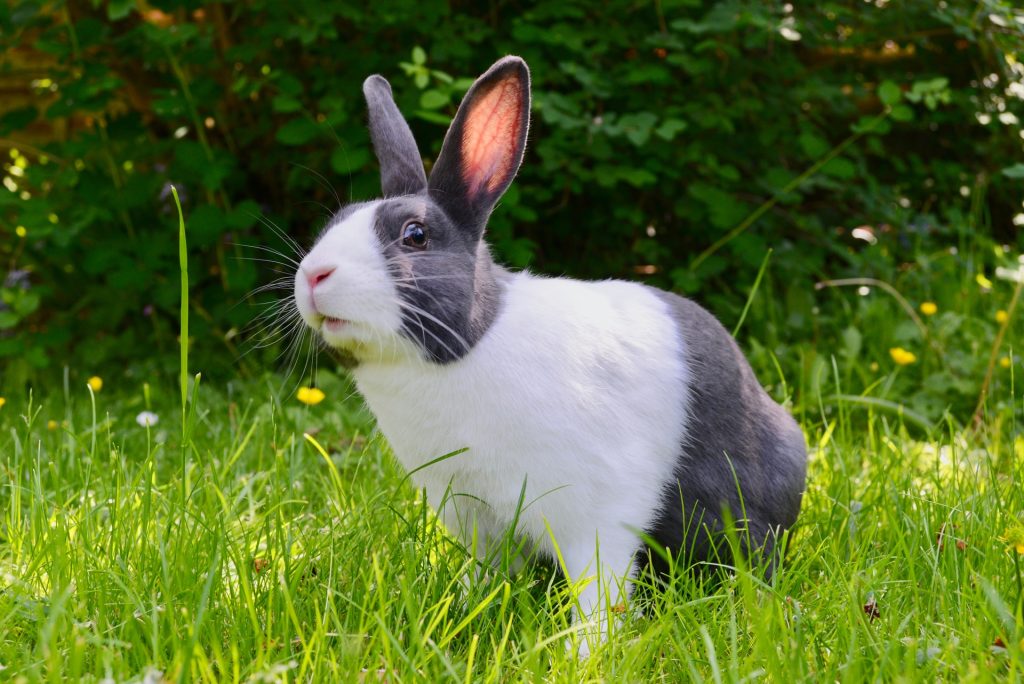

Pingback: What you need to prepare for your pet rabbit – fluffy family fun